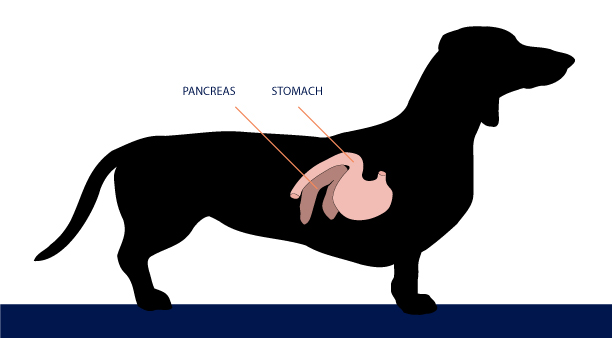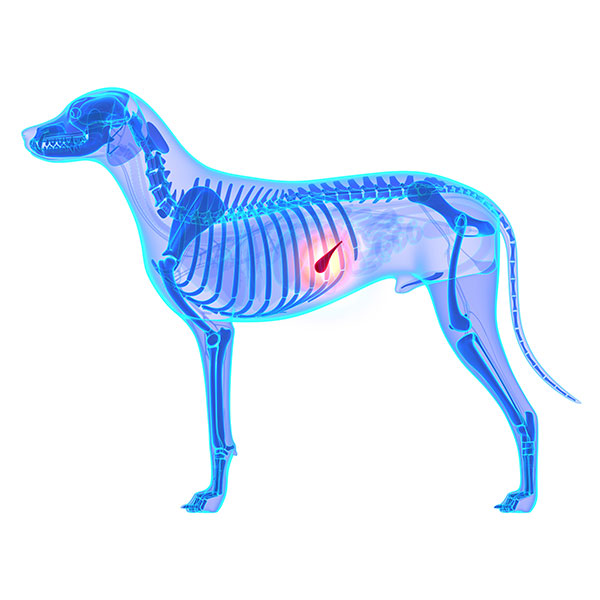
Unexplained Lumps and Bumps. Thats why its important to take your dog to the vet if they show any of these signs from weight loss to just acting unlike themselves so that the professionals can conduct further investigation into why your dog is ill.

Pancreatitis is a disease in which the pancreas gland becomes irritated and inflamed.
Signs your dog has pancreatic cancer. Pancreatic adenocarcinomas cancers affecting enzyme-secreting cells are more common – and much more aggressive – than insulinomas. Symptoms include abdominal pain vomiting and weight loss. Usually a vet can feel a mass in an affected dogs abdomen.
Since these tumors often block the bile duct jaundice is another common sign. Some of these signs include the following. Howling or whining Difficulty laying down or standing up Reluctance to move Sensitivity to the touch.
For example a dog with pancreatic cancer may show signs such as. Appetite loss Weight loss Lethargy Vomiting Abdominal distension Hyperglycemia elevated blood sugar level Ascites fluid accumulation in the peritoneal cavity Jaundice the. Depending on the type of tumor the signs of pancreatic cancer in dogs might be different from case to case.
Signs of Insulinomas In Dogs Insulinomas cause the pancreas to produce more insulin and lowers the blood sugar. Some of the symptoms of this type of tumor include. While physical collapse is the most common symptom a dog exhibiting any of these symptoms should be given medical attention immediately.
Symptoms can be sporadic due to the release of insulin. It may help to record any of these signs as they appear to assist your veterinarian in the diagnosis. Causes of Pancreatic Cancer Insulinoma in Dogs.
10 Signs of Cancer in Dogs Signs Your Dog Has Cancer. Here are some of the most common signs of cancer in dogs and the types of cancer that cause. Unexplained Lumps and Bumps.
Several forms of cancer can cause lumps or bumps on your dogs body including a mammary. Osteosarcoma is the. Be aware of signs of pain discomfort and distress in your dog.
These signs are often dramatic and can be a clear indicator that euthanasia should be considered. Difficulty catching their breath. Or wide and deep breaths that appear to be labored.
Pancreatitis is a disease in which the pancreas gland becomes irritated and inflamed. This inflammation occurs because the enzymes that are released by the pancreas become activated too soon damaging the very organ that produced them. This is a very serious disease that can negatively impact your dogs health.
To assure that your dog doesnt suffer from pancreatitis. Some of the signs that its time to say goodbye to a dog with cancer include. Drastic decline in their appetite or no interest in eating at all Rapid weight loss.
Lawn chemicals are a known risk factor for bladder cancer in dogs. Bladder cancer is slow to develop. Your dog may not show signs of this cancer for 3 to 6 months.
Urinary obstruction and bleeding are common signs. Pancreatic cancer is a tricky cancer to identify. In the early stages there might not be muchif anyindication something is even wrong and thats exactly why doctors often refer to it as a silent killer Of the 57600 cases that the American Cancer Society ACS estimates will be diagnosed in 2020 many wont be discovered until the cancer is at an advanced stage or has spread to.
With adenocarcinomas the signs can be vague until late in the disease process. Some pets will show signs of pancreatitis inflammation of the pancreas. This includes loss of appetite vomiting lethargy pain in the abdomen weight loss and sometimes yellowing of the skin jaundice.
Symptoms of Pancreatic Cancer in Dogs. These are common symptoms of insulinomas or adenocarcinomas but may also be symptomatic of something else serious going on with your pet. Bring your canine to a vet immediately if you notice any of the canine cancer symptoms listed below.
Tremors or walking unsteadily. Pay attention to the signs like weight loss abdominal pain vomiting diarrhea breathing problems lethargy fever and irregular heartbeat and your pups behavior changes. Take the dog to the.
Thats why its important to take your dog to the vet if they show any of these signs from weight loss to just acting unlike themselves so that the professionals can conduct further investigation into why your dog is ill. From there tests can be done to determine the root of the problem. Tests for canine pancreatic cancer can include.
Repeated vomiting either several times within a few hours or periodically over several days Pain or distention of the abdomen dog appears uncomfortable or bloated. Pancreatic cancer develops as abnormal pancreatic cells multiply rapidly in the pancreas. These cells dont die but continue growing to form tumours which in time can result in the death of the normal surrounding pancreatic tissue.
Canine pancreatic cancer is rare but the cancerous tumours adenocarcinomas are aggressive and malignant.